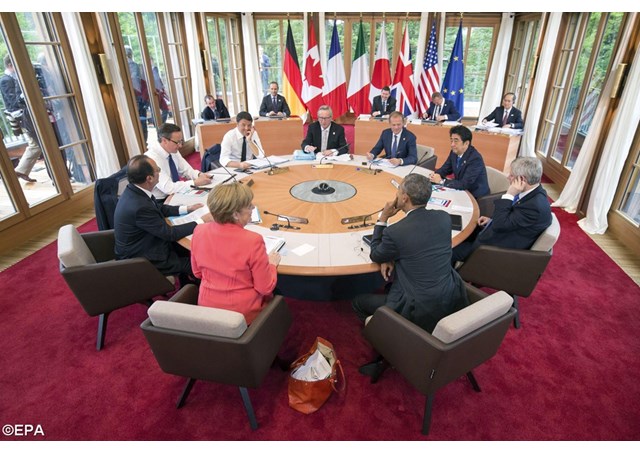
G7 leaders agree to maintain sanctions against Russia

(Vatican Radio) Leaders of the Group of Seven of developed economies have agreed to maintain sanctions against Russia until Russian President Vladimir Putin and Moscow-backed separatists fully implement the terms of a peace deal in Ukraine. The Ukraine conflict is dominating the G7 summit, which, among other issues, is also dealing with a long running debt standoff with Greece and trade deals with Asia and the European Union.
Listen to the report by correspondent Stefan Bos:
G7 leaders meeting in the Bavarian Alps want Russia and Ukraine to comply with a February 12 ceasefire agreed in Minsk, Belarus. The deal initially largely halted the fighting, but in recent days at least dozens died in what were the worst clashes between government troops and pro-Russian forces in eastern Ukraine in months.
The G7 leaders of Germany, Britain, Canada, France, Italy, Japan and the United States as well as the European Union agreed that sanctions against Russia, including economic measures and travel restrictions for targeted officials, should remain in place till the peace deal is implemented.
In German Chancellor Merkel words “any easing of sanctions depends largely on Russia and its behaviour in Ukraine”.
TERRITORIAL INTEGRITY
The EU's Council President Donald Tusk went even further. “My intention today is to reconfirm the G7 unity on the sanctions policy. So let me state clearly: Given the current situation if anyone wants to start a debate about changing the sanctions regime, the discussion could only be about strengthening it,” he said.
“The European Union as the entire G7 continues to stand firm in support of Ukraine's territorial integrity, sovereignty and independence,” Tusk added.
Tusk noted that Russia was banned from the G8 summit because of its annexation of Ukraine's Crimean Peninsula and actions in the east. He said the G7 also stood for values, including the right for demonstrators to protest.
Far away from the secluded, exclusive, alpine Schloss Elmau hotel near Garmisch-Partenkirchen, protesters rallied against what they view as the club's working for the interests of a happy view while forgetting about ordinary people.
Yet the G7 leaders believe crucial trade agreements will make life better for many. U.S. President Obama hopes to secure a Trans-Pacific Partnership pact, a 12-nation consortium that includes G7 partners Japan and Canada
The other G7 nations, Britain, France, Germany and Italy, have a stake in a U.S.-European Union trade deal that is on a slower course.
GREECE PRESSURED
But tensions remain with at least some EU nations including Greece. Speaking at the G7 summit, European Commission President Jean-Claude Juncker said Greek Prime Minister Alexis Tsipras failed to “deliver alternative economic reforms” amid rising concerns the country will soon be seen defaulting on its debts and leaving the euro.
However there were some more relaxed moments, when President Obama had a beer and listened to a performance by traditionally dressed Bavarian musicians in the sun-soaked alps. “I know it's a lot of hard work when I come to town,” the president admitted, sparking laughter within the audience.
“That was, without question, the best alphorn performance that I’ve ever heard. I have to admit that I forgot to bring my lederhosen. But I'm going to see if I can buy some while I'm here,” Obama joked.
Yet, more serious issue are awaiting him and his colleagues during the G7 summit.
| All the contents on this site are copyrighted ©. |


